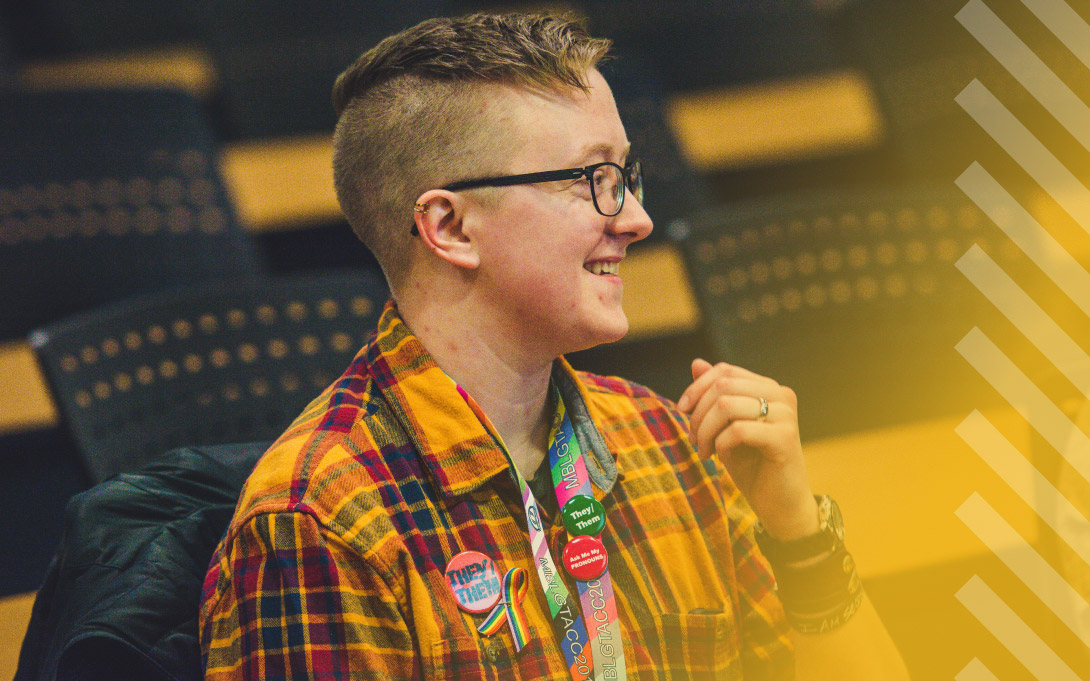
Last week, we announced the workshop tracks for MBLGTACC 2022: “Doing the Work in Rural & Small Communities,” “Taking Care of Ourselves to Take Care of Others,” “Designing a Queer Future Through Media,” “Activism & Protest as Tools for Justice,” and “Creating Change on College Campuses,” plus a track curated for advisors. A dedicated virtual track will also be available with a digital-first audience in mind.
What’s a workshop track and what do you mean by these track titles? Does my workshop have to fit within one of these categories? Can I get in touch with someone about a question? We’re here to share more about how we’re envisioning these tracks taking shape and answering some top questions as folks prepare for workshop applications to launch on April 4.
Tracks will be structured as a curated series of workshops centered around a common theme or topic.
For attendees, tracks will offer a great way for you to map out your conference schedule based on your interests or aspirations in these key areas.
For presenters, this will mean that, on the workshop proposal form, you’ll be asked to match your workshop to a track that best fits. Not every workshop will align perfectly with tracks, and not every workshop will be assigned to a track—that’s okay! We’ll have plenty of session slots available to include a variety of topics, presenters, and formats, whether they’re assigned to a track or not. Having this information up front will be an essential ingredient when it comes to organizing accepted workshops into time slots and locations.
About our tracks
Doing the Work in Rural & Small Communities: Rural and/or small communities are a major focus of this year’s conference to honor the LGBTQ+ communities who exist in these complex campus and community spaces. Communities outside of urban spaces are often disregarded by political campaigning and resource allocation, leaving marginalized communities to manifest their own models of advocacy, organizing, and activism. By focusing on the work being done in rural communities to bridge resource gaps, build extensive communities, and combat small town conservative ideologies, we expand our toolkit of possible tactics and strategies for social change.
Taking Care of Ourselves to Take Care of Others: There’s no doubt that the last three years since the onset of the global COVID-19 pandemic have amplified what marginalized groups already know to be harsh conditions, hard fights, and continued struggle. Experiences of burnout, disruptions to existing organization and education efforts, and constantly reacting to waves of injustice have weighed heavily on queer and trans communities. It is essential we dedicate time and attention to pleasure, joy, wellness, and healing in order to sustain ourselves, our communities and our movement.
Designing a Queer Future Through Media: Queer and trans folks know a thing or two about entertainment, content creation, media, and design! Whether the goal is advocacy for a cause, mobilizing people around an injustice, tightening a community through art and music, or bringing laughter and joy to your followers– media and content creation is a strong tool for gender justice and sexual liberation.
Activism & Protest as Tools for Justice: Justice and rights will never be handed over by oppressive systems. They must be demanded. College campuses, urban centers, and rural communities have all been sites for direct action, protests, and other forms of activism in recent years specifically around issues of racial justice, police brutality, student loan debt, and climate catastrophes. Queer and trans folks are highly represented among those on the front lines, in medic tents, and leading mutual aid projects.
Creating Change on College Campuses: College campuses are key areas of influence for our conference attendees. The history of higher education is rife with instances in which queer and trans people are underrepresented in programming, initiatives, and opportunities. College students, educators, and practitioners play an integral role in expanding possibilities for our communities on campuses and improving campus climate for marginalized people.
Advisor Track: We are huge fans of the folks on college campuses who dedicate themselves to supporting queer and trans college students as advisors, student support service staff or by way of “other duties as assigned.” The work performed by these individuals is often thankless or beyond their job description but plays a huge part in creating affirming spaces and experiences for queer and trans college students. We want to recognize this work and hold space for these roles who often attend the conference with their student groups.
Virtual Track: One of the major lessons learned through this pandemic is the need for hybrid options at large-scale events. As we continue to contend with the impacts of the health crisis and ensure Midwest queer and trans folks can engage with the conference, we are committed to providing a virtual experience tailored specifically for a digital-first audience– meaning we will ensure all content available to virtual ticket-holders is curated to prioritize their experience and that presenters/facilitators will be selected based on skills and experience working with virtual audiences.
Submit a workshop proposal starting on April 4
Presenters, read the full workshop track descriptions—including focuses for each—on our workshop tracks page. Registration and the workshop submission form open on April 4.
Don’t miss anything—Get MBLGTACC updates by email
Sign up to receive emails about MBLGTACC 2022 by submitting your email address using the "Stay Connected" form at the bottom of this announcement. Questions? Send us a message at hello@mblgtacc.org.
